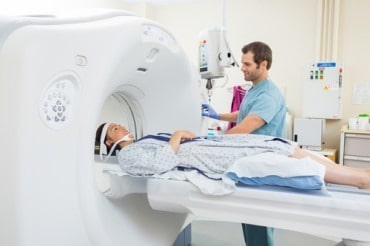
As we navigate the post-pandemic world (and grapple with Covid’s continual resurgence), voice technology supported by AI will be healthcare’s next big tool.
Artificial intelligence rocketed up the hype cycle during the pandemic, but no ascension is more fascinating than voice technology. With use cases in multiple industries, including the one on everyone’s mind—healthcare, voice tech investments, and deployment will only increase as we navigate a post-Covid world.
Voice technology’s potential contributions
Voice tech has multiple use case potentials even outside the common customer service applications. Researchers at Carnegie Mellon, for example, pioneered voice tech to identify potential Covid infections from the sound of someone’s voice and breathing patterns. MIT launched similar research into an algorithm that could analyze the sound of someone’s cough to determine asymptomatic Covid patients.
Voice tech also allows doctors to handle notes and documentation during Covid’s increased caseloads and will continue to aid the industry in collecting and organizing this type of unstructured data. As the demand for healthcare data increases, voice tech could provide critical new sources for this data.
See also: Credible Chatbots Outperform Humans
Healthcare’s voice AI needs
Artificial intelligence offers the healthcare industry incredible opportunities to upgrade systems and address challenges. Voice technology supported by AI can improve and expand healthcare outcomes. The applications cover a variety of purposes.
Documentation, Notation, and Paperwork
Physicians experience an astounding amount of required paperwork, reducing the time they can spend with patients and creating risks associated with human error. Companies such as MDOps and Suki use voice recognition to produce accurate documentation for doctor-patient encounters.
Other companies such as Sopris Health are using a combination of tactics, such as AI text prompts with voice recognition for documentation. The company also targets non-physician users who may not typically have access to this type of technology through a traditional healthcare provider.
Some companies are using voice tech to listen to patient-doctor encounters in real-time to add notes and documentation, but also provide the capability for specific voice commands. Tenor.ai, for example, offers a product capable of transferring voice recordings into accurate text.
The appeal of voice tech is that it makes it easier and more consistent for doctors and other healthcare providers to turn patient encounters into valuable data. Whether the documentation provides a history of care for reference or funnels into research and development, voice technology can do a lot to ease the demand for healthcare training data.
Diagnosis and Monitoring
Voice AI goes beyond simple documentation and could support physicians and healthcare providers in diagnosing disease, suggesting treatments, and monitoring progress. Since care plan nonadherence could be as high as 50% for chronic conditions, vocal technology could be a game-changer.
As mentioned above, new voice technology algorithms were deployed to provide new, less intrusive ways to detect Covid. MIT’s solution started originally as a way to detect Alzheimer’s earlier than any previous test could determine, for example. Other companies have explored “vocal biomarkers” to detect all sorts of chronic diseases, including Parkinson’s, PTSD, and concussion.
Companies like Beyond Verbal are also leveraging large voice datasets to advance diagnostic capabilities. The company showed initial potential in AI recognizing the signs of coronary artery disease. In a similar but more niche area, Corti used voice technology to analyze conversations people had in real-time with emergency dispatchers for signs of cardiac arrest. This could allow emergency departments to triage patients before they even arrive at the ER.
Voice technology could also help address challenges in continued patient monitoring. As healthcare providers increase the number of patients they care for, artificial intelligence could provide vital support in ongoing care. Startups like Healthymize use voice technology to monitor patients through ambient, passive means for respiratory diseases such as COPD. The tech can identify potential flare-ups and prevent unnecessary hospitalizations.
Improving mental health outcomes
Voice tech also has a place in mental health. Some apps are using AI-driven voice technology to analyze the vocal patterns of users in a method known as sentiment analysis. Apps like Wysa aim to walk users through conversation prompts and offer suggestions to reduce stress through AI conversation.
Others can help predict suicide risks or monitor patients diagnosed with severe mental illness through regular check-ins. These check-ins are driven by question responses, and AI analyzes patient responses to offer personalized analysis. Initial tests show that these response-oriented AI monitoring options show similar outcomes to physician-led monitoring.
The mental health sphere also benefits from documentation software such as those listed in the previous section. Voice tech aids documentation, sends notifications or alerts, and supports mental health professionals in their ongoing care of patients.
Increasing Accessibility
A significant barrier to quality of care is the presence of verbal or auditory challenges. Some voice tech apps hope to reduce the stress of interacting with healthcare providers. Voiceitt is in development for voice technology that recognizes nonstandard speech, a first in the field. On the opposite end of the conversation, VocaliD uses a combination of text and the Human VoiceBank (a 25,000 strong collection of diverse voice samples) to allow students to “speak” by typing.
Even more exciting, Ava is bringing accessibility for the deaf community into the real world by providing real-time “subtitles” for conversations. These vocal tech applications help users interact effectively with healthcare workers no matter the circumstances.
Healthcare voice tech applications will only increase
As we navigate the post-pandemic world (and grapple with Covid’s continual resurgence), voice technology supported by AI will be healthcare’s next big tool. It may have started with customer service and retail, but its usage will only expand to offer healthcare workers, facilities, and researchers the support they need to improve patient outcomes.
Even more important, it also supports patients in their pursuit of quality healthcare while improving convenience factors and overcoming barriers. It’s something to watch as healthcare evolves.




























